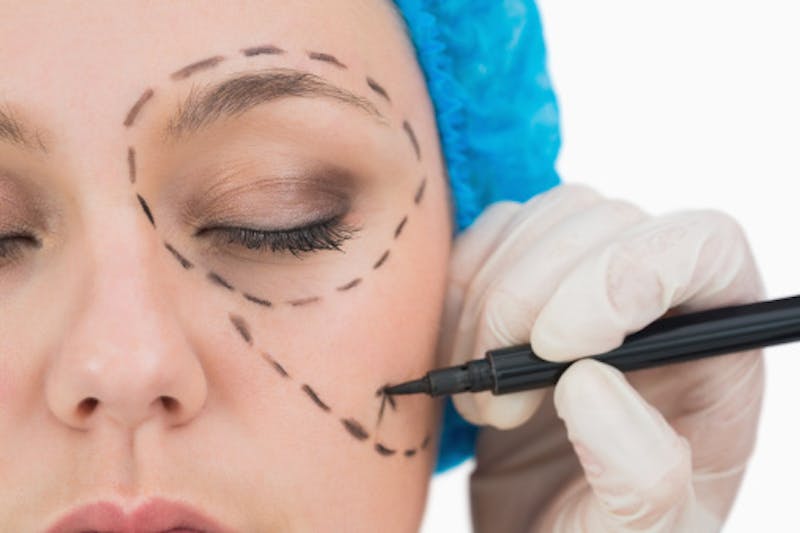
If you want a cosmetic procedure that tightens the skin around the jaw, neckline and lower portion of the face, a face lift might be appropriate. The results from a face lift typically last for years. A study published in the journal of the American Society of Plastic Surgeons in 2012 found that 75 percent of face lift patients still looked years younger five years after their surgery.
While a face lift gives you lasting results, the trade off is that the surgery and recovery are more intense than the procedure and recovery from an injection. If you are considering facial surgery to take years off of your appearance, fully discuss the recovery process with your surgeon so that you have a clear idea of what to expect.
What You’ll Feel Right After Surgery
It’s likely that you will feel some discomfort when you wake up after the surgery. Pain is usually minimal and a surgeon will typically prescribe medication to relieve it. Usually, the pain will be at the site of the incisions, behind the ears.
Numbness in the skin is more common after a face lift. The skin by the ears might feel numb for up to nine months after the procedure, though in many cases sensation returns to the area after a few weeks. The numbness is caused by elevating the skin during the procedure. There are cases where numbness is permanent, but that only occurs if a nerve in the neck was damaged during the procedure.
It’s also common to feel tightness across the face following surgery. That’s a good thing, as it means the face lift was effective and that the results should last. Usually, the tight feeling resides after a few months.
Sutures and Bandages
You will have some dressings and sutures after the surgery. A compressive bandage is wrapped under your chin and around your cheeks to help control swelling. It’s usually removed the day after your surgery.
Your surgeon will typically remove the sutures from incisions after a week. Typically, the suture by the lower ears is left in place for two weeks after the procedure.
Bruising and Swelling
Expect to see some swelling in the facial area as well as bruising after your surgery. You can help reduce swelling by sleeping with your head propped up. Ice and cold compresses are also great for bringing down swelling. It might seem as though the swelling gets worse as the days go on. In a lot of cases, swelling is most visible by the third day, but starts to recede after a week or so. The amount of bruising and swelling you experience depends on the type of procedure you choose. Swelling and bruising are generally less noticeable and last for less time after a mini-face lift, for example.
Back to the Daily Grind
Depending on individual circumstances, you’ll most likely be able to resume your daily life within two weeks of the face lift. Talk to your surgeon about the specifics, though. You might be able to resume driving within a few days of surgery, as long you are not taking pain medication. Before that, it can be too difficult to drive, as you might have limited motion in your neck, which can make it difficult to check blind spots.
Typically, patients will take two weeks off of work to recover from their surgery. When you can return to work depends on the type of job you have. If you have a sit-down job in an office, you can go back to work sooner than someone who has a job that requires a lot of movement or straining. It’s often recommended that patients wait three weeks before taking up an exercise routine again or participating in any activity that requires physical exertion.
Clothing
During your face lift recovery, you need to be careful not to rub the incision area or put any force on the area. Even pulling a top on over your head can abrade the incision, delaying healing or causing an infection. As you heal, it’s best to stick with shirts that you put on by buttoning or zipping up.
Skincare and Cosmetics
It’s important that you care for your skin well after your surgery. Keeping the area clean, particularly by the incisions, will help keep infection at bay. Talk to your surgeon about the best cleanser and moisturizer to use to avoid irritation.
Usually, you can start to wear makeup to cover up bruising by the seventh day after the procedure. Wearing cosmetics can help you get back to your regular life more quickly, as you won’t have to worry about people noticing the bruising or asking you questions. Choose a lightweight makeup that won’t clog pores and that doesn’t contain oil. Your surgeon can give you specific advice, but usually a mineral foundation is your best bet after a face lift as it provides full coverage without much weight.
As you recover from a face lift, remember to see your surgeon for planned follow-up appointments. During the appointments, you can express any concerns you may have, and your doctor can make sure you are on track. For more information on face lift surgery and recovery in Chicago, contact Dr. George Moynihan at Gold Coast Plastic Surgery. Use the online contact form or call the office at (312) 988-9300.


